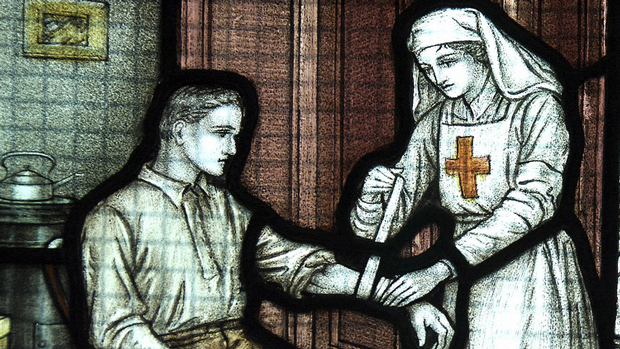The metaphors we apply to the Church shape us. Enjoy this musing from good friend, pastoral inspiration, and PARSE regular A.J. Swoboda. – Paul
Last June, I led ten eager college-age students from my church on a tour through the ancient city of Rome. Around noon one Sunday, our group rode the bumpy subway into the heart of the city to the Vatican, home base for the Roman Catholic Church. We thought it would be a quiet day. We were wrong.
Walking into Vatican square, we were caught off guard, surrounded on every side by a surging sea of thousands upon thousands of pilgrims from every corner of the globe. They had come to see something that Sunday afternoon. The place was packed, and we had no idea why.
We were fed, not in intellect, but in heart.
We found ourselves squarely in the middle of a group of weeping nuns who'd journeyed across the world to see the Vatican—and were visibly overwhelmed by their experience. And why shouldn't they be? Vatican square is a holy space, a place I have deep appreciation for. It was there that Pope Francis had been ordained a few months earlier as the new head of the Catholic Church. And it was there Francis had delivered his first Sunday homily, finishing his sermon with perhaps the best benediction offered in all of Christian history:
"Have a nice Sunday and a nice lunch."
Peter would have been proud. Then it happened. As if cued by some unseeable signal, the swelling crowd began to scream and cry and wave giant flags like the Beatles had once again come to Shea Stadium. Then we heard a voice and we saw him. Out of a small window atop a main building, Pope Francis had himself crested a window, stood to a microphone, and begun to deliver a homily. Unfortunately, for our sake, it was in Italian. But that didn't matter. Hearing that Italian sermon was proof that a sermon doesn't have to make sense to inspire or speak to the soul. We were fed, not in intellect, but in heart. It was one of the most overwhelming experiences I've ever had.
Then we went to lunch, just as Francis would want.
Buildings and souls
What stood out most to me was the way in which the Vatican's architecture had an almost visceral and moving effect on my soul. As an aficionado of Church history and its architecture, it's easy to see that the architects of the Vatican in years past had in mind to create an overwhelming space that would have a lasting spiritual effect on those who would enter it. The columns, statues, and grandiosity of it all are fashioned in such a way as to open up one's eyes to the grandeur and power and transcendent majesty of God; that everyone who should enter its space would be moved to sense afresh God's vast love, power, and authority.
I can tell you, it worked.
Evangelicals often wonder why the Roman Catholics construct such over-the-top buildings. And the answer is: they did their architecture homework. Roman Catholics know what a good building can do to a soul. There's an old architectural maxim: people build their buildings, then their buildings build people. This idea expresses the truth underneath all the painstaking toil of dreaming up, planning, and building any building like the Vatican—by building a building we're actually building ourselves. This same truth is equally applied to the relationships that we constructs, our social architecture. For in our efforts at building social architecture, we will find that those relationships construct us back. The relationships we build will build us.
Tease this out with me a little. What if we actually understood God Himself in the Bible as a kind of architect, brilliantly constructing the created world in such a way that the very world he constructed would construct us back? That as humans would look at the Grand Canyon, or a snowflake, or the intricate complexity of the human brain, we'd be forced to stop and wonder about God's beauty, grace, brilliance, and majesty. I once came across a brilliant piece by Nicholas Choy who suggested that God is just that, an architect—separating light from dark, land from sea, species from species—as any draftsman would do in the crafts of architecture.[1] God, the architect, constructed the world in a way that it would construct us. Even the architecture of the New Jerusalem depicted in Revelation 21 speaks of this brilliant Divine Architect—Christ is at the center with endless layers of culture, architecture, and creational flourishing all coalescing a harmonic picture of a renewed creation.
Buildings can bring us life. But buildings can also be very destructive to the human soul. In the 1950's, Elizabeth Gordon wrote a powerful book called Home Beautiful in which she argued that the very architecture of the suburban landscape was the backbone and the engine of individualism, greed, and selfishness—it was the "architecture that will encourage the development of individualism."[2] Suburbia—a matrix of self-contained homes, garage doors, sheds, and fences—is not only the result of individualism but the actual architecture that feeds individualism. Individualism built suburbia, and suburbia is feeding our individualism.
So what does this have to do with the church today?
Architects of metaphor
I believe we can apply this same principle about buildings that we build to the way we talk about church. Our metaphors for church serve not only as descriptions of the church but blueprints for the way we understand and live in the church. That is, that our metaphors have actually shaped the way we imagine the church.
Let me draw your attention to one example that taps into the vein of some hard discussions within Evangelicalism in recent weeks. Consider the metaphor of the church as "hospital." We've all heard this one. This metaphor is not drawn from Scripture. But even so, it is a very popular way of discussing the church—used for years, and often for good reason. To imagine the church as hospital moves us away from thinking of the community of God's people as a place for fixed-up, perfected saints who gather week in, week out that they might piously retreat from the world of the sick sinners around them. In that sense, the church as a hospital bears an important truth: we are a community of sickos being drawn to the Good Doctor.
But the implications of that metaphor are actually quite destructive. By saying the church is a hospital, we imply two things—first, the picture of a church as a building that employs a class of professional elite healthy people who get paid to get sick people better. Second, the church as a place someone goes when they're sick but should leave when they're healthy. (Nobody lives in a hospital.)
Seeing the church as hospital subtly implies that the church has value until you are better. Then, once you're better, matured, healthy, evolved, no longer in need of its services, whatever it may be, you no longer need to go. When we honestly examine the church in the 21st century, isn't this precisely the way in which our general body of Christians think about and imagine our relationship to God's church?
We've become our metaphor. The church of the 21st century looks more like a hospital than it does the church of Jesus.
The minute we built that metaphor it started building us back. The church is still largely an entity that is perceived as a building, that exists on the backs of a professional class of highly trained elite, and is something we go to until we no longer need it. On top of it, we (hypocritically) get flustered and angry when our favorite Christians admit that they no longer find what they are looking for in the gathered church. But how can we get mad at them?
I may disagree with them (and I do), but I called the church a hospital. I preached that. It's as much my fault as it is anyone's.
Friends, we're getting what we've been preaching. Our sermons have not returned void. We've become our metaphor. The church of the 21st century looks more like a hospital than it does the church of Jesus.
A better metaphor
I pastor a church. I am completely sold that Christians needs to be in the life of a community that worships. Christians need to have to turn and greet people they don't like. A Christ-follower needs to be in a community that can breathe down its neck and hold them accountable. Believe me—I believe in the church.
I, like the rest, can get angry at people for leaving the church. I can make great arguments as to why people should be in the gathered church. I believe in the church with all my heart and I lay my life down to serve it.
We need to repent from getting angry at people for treating the church the way we've trained them to treat the church.
But we need to repent from getting angry at people for treating the church the way we've trained them to treat the church. We shouldn't get angry at them for doing what we asked. No building is at fault for its architect's foolishness.
The question is asked: well, do you have a better metaphor? Frankly, I think the best metaphors for the church have actually already been built. I like Paul's metaphor of the church as a mysterion, a "mystery." (Eph. 3:3-6.) The church as a mystery is the community of faith, the gathering of the saints. We do not enter a mystery because of what it gives us or what services are provided for us or how it makes us feel or if it makes our adrenaline glands go crazy. We simply enter it. And by entering into it, stuff happens way below the surface that neither you, me, or the weird person next to you at greeting time can put words or rationality into. It's a mystery.
When it's a mystery, friends, the sermon might as well be in Italian; it doesn't matter. When it's a mystery, the way the music is done doesn't matter. A mystery is a mystery, and we don't enter for a reasonable reason. Throwing oneself into the church is similar to the way C.S. Lewis described communion. In Letters to Malcolm, Lewis writes, "The command, after all, was Take, eat: not Take, understand."
A mystery isn't understandable. A mystery isn't rational. Or manageable. Or logical. It's everything a hospital isn't.
A mystery isn't understandable. A mystery isn't rational. Or manageable. Or logical. It's everything a hospital isn't.
A mystery is entered simply for the sake of the mystery.
The church will always be a victim of its metaphors and it will always be a beneficiary of its metaphors. We should still think up new ones. But we should remember that in time, friends, the metaphors that we build will build us back.
Dr. A.J. Swoboda is a pastor, writer, and professor in Portland, Oregon. He is @mrajswoboda on Twitter.
[1] {Choy, 2009 #1880}
[2] Quoted in Delores Hayden, Building Suburbia: Green Fields and Urban Growth, 1820-2000 (New York, NY: Vintage, 2004), 17









